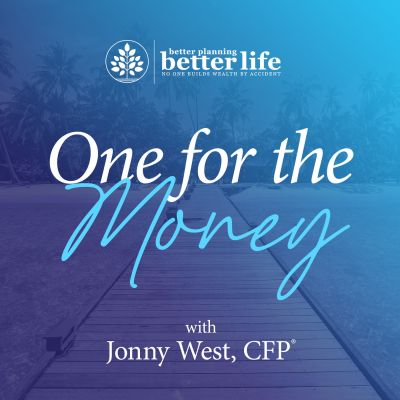Listen to hear Jonny break down the tips, tricks, and strategies he uses to help clients retire early. This is the "easy button" when it comes to early retirement because everything you want and need to know is right here. Jonny will lay it all out in plain English so you can get the details on the actions you can do to put yourself on the best path to early retirement. He'll also interview top real estate, tax, and estate planning and other professionals to provide a comprehensive approach to your retirement planning. Nobody builds wealth by accident. Listen to find out how you can do it on purpose.
https://one-for-the-money.captivate.fm
episode 27: Can You Retire with Debt?
Can you retire when you have debt? This episode of the One for the Money podcast focuses on answering that question. More and more Americans are retiring with a mortgage, but is it right for you? Doing so depends on many factors that can’t be assessed in isolation. Listen to the end when I share a simple strategy to pay off your mortgage early.
In this episode...- Keeping mortgages past age 65 [01:44]
- Why are more people retiring with a mortgage? [02:57]
- Retiring with a mortgage [06:58]
- Debt and relationships [08:16]
Advantages of paying off the mortgage
Whether you can retire or retire early with debt depends on the type of debt you have. If you don’t have a three- to six-month emergency fund, have multiple sources of debt, have multiple credit cards to pay off, have an auto loan, and have a mortgage, then the answer is almost certainly no. If you only have a mortgage, retiring may be possible depending on several factors, such as retirement income, mortgage payment, mortgage interest rate, and years remaining on the mortgage.
Having no debt, including a mortgage, makes retirement so much easier. I wouldn’t recommend an early retirement before paying off your home. Paying off your mortgage early essentially provides a risk-free rate of return. For example, if your mortgage rate is at 5%, paying it off early saves 5%. While that savings isn’t an incredible rate of return, it’s pretty fantastic, considering you don’t have to pay that on the loan. However, more and more Americans are entering retirement with a mortgage. A 2016 report by Harvard’s Joint Center for Housing Studies showed that in 1996, 25% of homeowners in their late 60s to 70s still had a mortgage, but in 2016 that number had jumped to nearly 50%.
Why are more people retiring with mortgages?Several developments over the last three decades may explain the dramatic increase in the share of retirees with mortgages. Americans today seem to have less aversion to debt than the generation that grew up after the Great Depression. Although consumer debt levels always ebb and flow with economic cycles, total debt as a percentage of disposable income is significantly higher today than in the late 90s. The Tax Reform Act of 1986 made mortgages a more attractive form of debt. The reform eliminated the income tax deductions for interest on credit cards and other types of consumer debt with one exception: mortgage interest.
For the majority of the last decade, mortgage rates were extremely low. While the rates have climbed rapidly this year, 85% of homeowners in the United States have a rate lower than 5%. That makes taking a mortgage into retirement a little more manageable. People have also been purchasing homes later in life because homes have become expensive. In the late 80s and early 90s, housing prices were about three times the typical household earnings, while prices today are more than four times.
Paying off your mortgage earlyA simple tip to paying off a mortgage early is making one extra payment each year, applied to the principal. What kind of difference can that make? Let’s say you secured a 30-year fixed-rate mortgage for $400,000 with a 5% interest rate. Your regular monthly payment would be $2147 per month. If you make an extra monthly payment of $2147/per year, you’d pay off your 30-year mortgage four years and five months early and save over $62,000 in interest in the process.
That’s a huge savings of time and money, which would set you up very well for early retirement. Ultimately, a paid-for home gives you something a mortgage cannot: peace of mind. Removing that worry significantly impacts psychology and happiness, which is why I believe a paid-for home is a critical piece of early retirement planning.
Resources & People Mentioned- More Retirees Today Have a Mortgage
- Housing America's Older Adults 2019
- Nearly 10 Million Homeowners 65 And Older Are Still Saddled With Mortgage Debt
- How Many Taxpayers Itemize Under Current Law?
- 85% of Homeowners with Mortgages Have a Rate Far Below Today's Level, a Factor Prompting Many to Stay Put
Connect with Jonny West
- https://BetterPlanningBetterLife.com
- Schedule a meeting with Jonny
- Connect with Jonny on LinkedIn
Subscribe to ONE FOR THE MONEY on
Apple Podcasts, Spotify, Google Podcasts
Audio Production and Show notes by
PODCAST FAST TRACK
